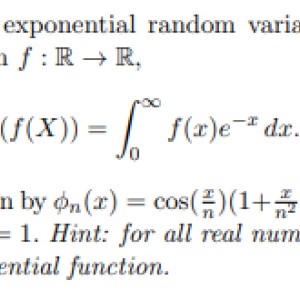Probability Question
(See picture for better formatting)
Let X be a standard exponential random variable, so for any non-negative Borel function f : R → R,
E(f(X)) = $\int_{0}^{\infty } f(x)\cdot e^{-x} dx$. Let φn : R → R be given by φn(x) = $\cos(\frac{x}{n}) \cdot(1+\frac{x}{n^2})^n$ for all x ∈ R. Show that lim n→∞ E(φn(X)) = 1.
Hint: for all real numbers x, $1 + x $ ≤ $e^x$ by convexity of the exponential function.
 L Ellis
L Ellis
Answer
- The questioner was satisfied with and accepted the answer, or
- The answer was evaluated as being 100% correct by the judge.
1 Attachment
-
You should set later deadlines for your questions. A few hours is too early. Ideally you wanna give at least 24 hours if possible.
-
I agree, but I'm in a bit of a crunch unfortunately!
-
I am busy at the moment, but If you extend the deadline of your other question I may be able to help. You may also want to offer higher bounties to give users more incentive to accept.
-
I can't extend unfortunately, the deadline is quite soon
-
Thanks for the rest, though!
- answered
- 1520 views
- $8.00
Related Questions
- How do we take the mean of a mathematical function using statistics?
- Quantile function of CDF
- Does the sequence $f_n=\arctan (\frac{2x}{x^2+n^3})$ converge uniformly on $\mathbb{R}$?
- Application of Integral (AREA UNDER THE CURVE)
- How to adjust for an additional variable.
- Evaluate $\int_C (2x^3-y^3)dx+(x^3+y^3)dy$, where $C$ is the unit circle.
- continuous function
- Evaluate the surface integral $\iint_{S}F \cdot dn$ over the given surface $S$

